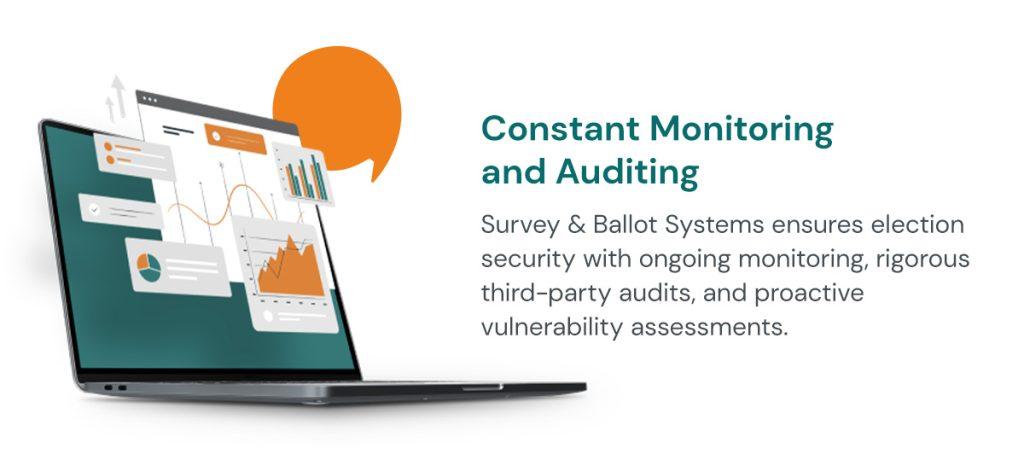An Overview of National Election Security for Private Organizations
The U.S. has seen its fair share of chaotic elections, especially in recent years — and the public’s confidence in election integrity has fallen significantly as a result. And now that emerging technologies like artificial intelligence (AI) and cryptocurrency have entered public awareness, concern over online election security is growing.
While most private elections don’t have nearly the same visibility as the presidential race, our nation’s history serves as a great reminder of why election security matters.
What Is Election Security?
Election security is essentially the process of protecting the integrity of your organization’s election processes — which is a crucial consideration when voting for new leadership, as it affects everyone in the organization.
Prioritizing election security helps you reduce the risk of losing integrity from election interference tactics, such as:
- Voter fraud: Malicious actors can swing elections by recording fraudulent votes, allowing individuals to vote multiple times, or even allowing voters outside your organization to cast ballots.
- Deliberate miscounting: A malicious actor can throw election results by introducing recording, counting, or tallying errors into the system by hacking your database or by tampering with paper ballots.
- Destroying or altering records: To prevent an auditor from discovering their crimes, election hackers might tamper with your election records so they reflect a different outcome.
Election security goes beyond preventing bad actors from affecting the election results. It also involves protecting your voters’ information from falling into the wrong hands.
Key National Election Security Standards
Government agencies must comply with a set of election security standards to ensure fairness, transparency, and validity. The Center for Internet Security (CIS) has developed a comprehensive online handbook that government agencies can use to ensure their election infrastructure is reliable according to these standards.
Private organizations can also use these guidelines to inform their approach to election security, as the general rules work for elections at all levels.
Best Practices for Securing Election Services
Your members expect their votes to matter — and that their personal data will be safe from unauthorized individuals. Following these best practices can help you ensure a smooth and secure election, which is critical for meeting member expectations and maintaining your organization’s reputation.
Achieving and Maintaining SOC 2 Compliance
Systems and Organizations Control 2 (SOC 2) is a framework of voluntary standards for secure data usage and disclosure in service organizations. The standard is based on a set of five trust services criteria (TSC) that help organizations report on the relevant internal controls they use to protect customer data:
- Security: All organizations must protect their systems and data from unauthorized access using solutions like access control and identity management.
- Availability: Organizations must ensure their systems are available and data is accessible to authorized users.
- Processing integrity: Organizations must ensure processing for systems and information is complete, accurate, valid, timely and relevant to their overall mission statement.
- Confidentiality: All valuable or sensitive information within the system has the appropriate level of protection in place to prevent unauthorized usage or access.
- Privacy: Organizations must explain to voters how they collect, handle, and dispose of personal information to prevent unauthorized access and improve internal processes.
Although security is a requirement for all service organizations, the other TSC that apply to you will vary depending on your industry, organization size, business model, and other important group characteristics.
Survey & Ballot Systems fully complies with SOC 2 in all our digital and hybrid voting solutions, so you can count on us to provide highly secure, trustworthy voting software for elections at the local, regional, state, and national levels.
Constant Monitoring and Auditing
Using a reliable and auditable system is essential for ensuring a valid, safe election. That’s why Survey & Ballot Systems ensures election security with ongoing monitoring, rigorous third-party audits, and proactive vulnerability assessments. Our monitoring and auditing measures include:
- Ongoing vulnerability assessments: We regularly scan all web applications for potential threats, including malware and ransomware, to reduce your organization’s cybersecurity risk.
- 24/7 monitoring and response: Our solutions monitor your voting systems around the clock to ensure a rapid response and resolution to any threats as soon as they appear.
- Dedicated infrastructure management: We provide a dedicated project manager for each election project to help you design and manage a solution that matches your organization’s unique requirements.
Web Hosting and Encryption
Web hosting is the process of storing your website or application resources on a service provider’s infrastructure rather than your own servers. While there are multiple levels of web hosting services available, this arrangement is generally more secure than running your own infrastructure because providers often have access to more advanced cybersecurity technologies than most businesses.
Working with the right web provider is key here. At SBS, we host our clients’ election projects with leading service providers such as:
- Microsoft Azure
- Flexential
- CDW
Encryption is another key component of online election security, as it makes user data unreadable to all unauthorized individuals. Unless they have the decryption key, a threat actor cannot interpret or alter the scrambled data — which effectively protects your members from potential harm.
SBS uses Symantec® TLS encryption to protect your election data from unauthorized individuals, which is one of the most secure encryption standards available.
Quality Assurance
Even with the most advanced security technologies and services at your disposal, issues can still slip through the cracks. You need to consider every potential vulnerability and gap in your election infrastructure to ensure nothing undesirable can impact your results.
That’s why we at SBS believe it’s vital to perform election quality assurance processes like:
- Dedicated teams: Our staff includes statisticians and other professionals who are completely dedicated to ensuring accurate election results through regular audits and improvements.
- Database confirmations: Make sure your member database is accurate and up to date to ensure voters receive the information they need — and that non-members are unable to cast votes.
- 2-D barcodes: 2-D barcodes are used during the mail assembly process, ensuring each ballot is accurately matched to the correct envelope.
That’s also why we assign a dedicated project manager to each election project we work on. This experienced individual works one-on-one with our clients to ensure projects are running according to schedule and provide informed recommendations for better accessibility, security and more.
Create a Secure Election Process With Survey & Ballot Systems
Ensuring a secure and valid election is important for more than a smooth transition of power between members — it also preserves your organization’s reputation and inspires greater loyalty among your voters.
At SBS, our mission is to provide streamlined solutions that simplify internal elections for private organizations like HOAs, unions, mutual insurance companies, and more. Whether you’re conducting a national election or a local one, our custom election solutions can help you create and manage secure elections at every level of your organization.
Ready to get started? Contact us today to request a free quote.

Hannah joined SBS in June 2022 and currently holds the role of Marketing Strategist. She graduated with a bachelor’s degree in Marketing from the University of Minnesota Duluth, with coursework in English literature complementing her skill set. Creating content for SBS, her contributions span from graphic design to crafting informative election resources, like blogs and eBooks. Hannah also manages email communications and is responsible for producing the SBS Newsletter, “The Ballot Box”.


